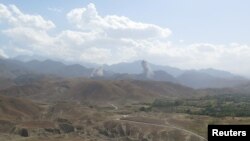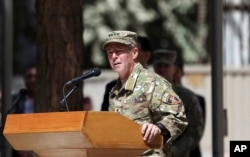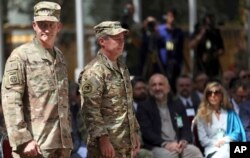U.S. forces in Afghanistan say they targeted and killed the leader of Islamic State Khorasan Province last month in eastern Afghanistan.
ISKP is the branch of IS operating in Afghanistan, Pakistan, and the vicinity.
Abu Sayeed Bajaur, also known as Abu Saad Orakzai, is the third ISKP leader killed by coalition forces in the past two years.
The announcement came Sunday, when a new U.S. commander took charge of the NATO and U.S. forces in Afghanistan. General Scott Miller said a vital part of his mission in Afghanistan is to keep the country from becoming a safe haven for terrorist groups.
“America and her allies are in Afghanistan to maintain pressure on the networked, trans-regional terrorists attempting to plot, resource and direct attacks from here,” he said.
While ISKP has been facing pressure in Afghanistan and the area under its direct control has been reduced by increased U.S. air strikes, including dropping the biggest non-nuclear bomb called a Massive Ordinance Air Blast last year, it has managed to carry out more brazen attacks in various parts of the country.
Last month, a deadly attack in a Shi'ite neighborhood killed dozens of students giving university entrance exam. Shiites have been frequent targets of ISKP in Afghanistan.
In 2017, Nangarhar, parts of which have been an ISKP stronghold since 2015, proved to be the deadliest place on earth for the U.S. forces. This was where they lost one third of the 21 U.S. service members killed in battle that year.
Despite the violence, General John Nicholson, who handed over command to General Miller, insisted the group is not growing.
"They have been able to replenish a portion of their losses by recruiting from other violent extremist organizations," he said in an email statement to VOA. "Despite this recruiting, they are losing fighters and losing ground."
Jeff Seldin contributed to this report.






